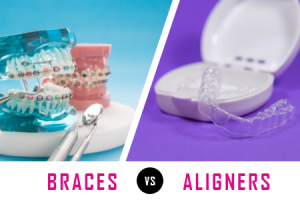How to Decide Between Braces and Clear Aligners
When considering the options for orthodontics, there are many pros and cons to consider before making a choice. And like most choices, the decision varies from person to person depending on their oral health needs, and dentist’s recommendations. Here Advanced Dentistry by Design in Carson City will discuss the differences between braces and clear aligners and help you and your dentist decide what’s best for you.
considering the options for orthodontics, there are many pros and cons to consider before making a choice. And like most choices, the decision varies from person to person depending on their oral health needs, and dentist’s recommendations. Here Advanced Dentistry by Design in Carson City will discuss the differences between braces and clear aligners and help you and your dentist decide what’s best for you.
- Braces are visible, aligners are clear
Perhaps the biggest difference between these two options is the most obvious. While there are a variety of braces people can go with for cosmetic purposes, the fact of the matter is that braces can be seen whether we attach them to the front of the teeth or to the back of them. Meanwhile, clear aligners are close to unnoticeable plastic molds of a patient’s teeth. Ivory brackets are attached to the teeth and are used to allow the thin trays of the aligners to slide effortlessly into place. This brings us to the next big difference…
- Braces are affixed, aligners are removable
For stability and functionality, we secure braces into place on the patient’s teeth for the entirety of treatment. Although this may cause discomfort, it is a suitable alternative to the possibility of losing them. The same cannot be said for clear aligners, which could be lost in any number of ways. And due to their near invisibility, they can be as elusive as a missing contact lens. However, their removability is convenient for brushing and flossing, or for certain social gatherings, or even for speaking engagements where clarity of speech is a factor.
- Braces are traditional, aligners are advanced
Braces are the go-to treatment for many orthodontists, and it has been that way for decades. Despite that, braces have changed with the times and today they are available in multiple varieties. Stainless steel braces are the standard, but they can also be gold colored, or even tooth colored ceramic to blend into the patient’s teeth. Clear aligners are the way of the future. They make dental treatment less conspicuous, and they are becoming the preferred method for today’s clinicians.
- Braces take time to adjust, aligners less so
When braces are applied, a bit of pain is to be expected at the beginning. They are slowly moving the bones and straightening your teeth. The wires and brackets attached to the braces can irritate the gums at the base of teeth or on the sides of the mouth. However, this is only temporary. Eventually, the mouth will adjust to these dental appliances to the point where a patient might forget they have braces in the first place. When it comes to aligners, a patient might be tempted to remove them due to the initial discomfort, but this is inadvisable because it will prevent the aligners from doing their job. By sticking it out, the patient will find that this onset of pain is easily manageable and will dissipate shortly. It is all for the greater good.
- Whether braces or aligners, always be brushing
Frequent brushing and flossing is a given when a person has braces. Make sure to remove all food debris and plaque buildup to ensure that teeth remain healthy. As for aligners, you must be remove them when brushing and flossing, and teeth must be squeaky clean before reinserting them. With both braces and aligners, soda and sugary foods are to be avoided at all costs. If anything gets caught in either of these appliances, the tooth decay that could result. So, listen to your dentist and steer clear of sugary drinks and foods that are crunchy or chewy.
There is no ‘wrong’ choice for orthodontics. However, your dentist is best equipped to help steer you in a direction that will be best for your specific issues. If you have questions and would like to learn more about orthodontic options, let us know! Contact Advanced Dentistry by Design to schedule an appointment!
The content of this blog is not intended to be a substitute for professional medical advice, diagnosis, or treatment. Always seek the advice of qualified health providers with questions you may have regarding medical conditions.
